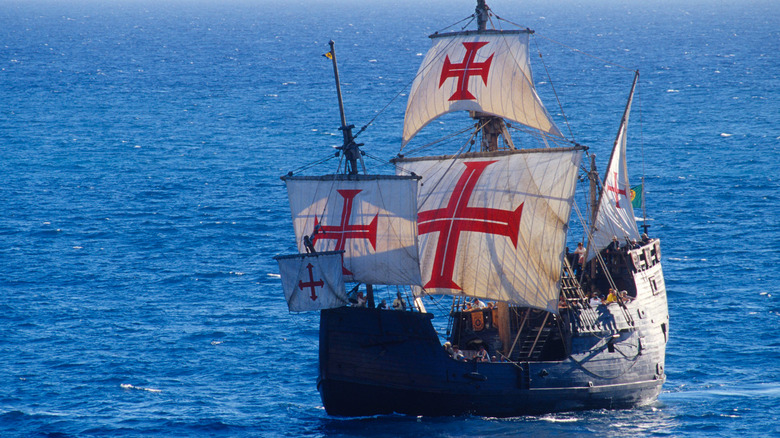How Christopher Columbus Nearly Starved His Crew To Death
In contrast to the whims of historical revisionists, the concept of a spherical Earth had been accepted by the fifth century BC, by which time various Egyptian and Greek scholars had established its shape and rough circumference. This was accepted as fact for centuries, as was the case in the late 15th century for both Christopher Columbus and the monarchies of Europe. When the former repeatedly requested patronage from Portugal and Spain for a voyage across the Atlantic, there was no concern that he would fall off the edge of the world.
Instead, it was that Columbus had gravely under-calculated the size of the Earth relative to the already accepted ancient estimations. For this reason, Columbus was repeatedly turned down until the potential economic benefits of a cheaper route to the Indies eventually persuaded King Ferdinand and Queen Isabella to sponsor him in 1492 (via HistoryThings). Columbus, his three ships, crew, and food supplies meant for a far shorter journey sailed for the Canary Islands. From there, the westerly winds brought them to what should have been their doom, had it not been for two unaccounted-for continents.
After four voyages, Columbus' crew still almost starved to death
According to History, the Santa Maria was a caravel-type ship, meant for transporting large amounts of goods. The Niña and Pinta were dwarfed by it and as such could not carry enough provisions for the (actual) distance of this voyage. This contributed greatly to the several instances of near mutiny Christopher Columbus faced (via American Heritage). Since a correlation between fruit and scurvy wouldn't be formulated until 1753 (via BBC), the disease was rampant among the crew; this wasn't even accidentally remedied by the second voyage, as they chose imports from Spain over exploring local food sources such as tropical fruit.
This may seem understandable, but surely by his fourth and final voyage Columbus would have learned and brought the necessary amounts of food, right? This in fact was not to be, as he and his crew were reliant upon the good will of the Arawaks of Jamaica when they ended up stranded there in 1503. As Medium reports, the natives were incensed by the increasing violence of the agitated sailors, and after two months refused trade. While this blockade was broken by Columbus' use of a solar eclipse as evidence he had divine backing, such measures were only the result of his misplaced priorities.

